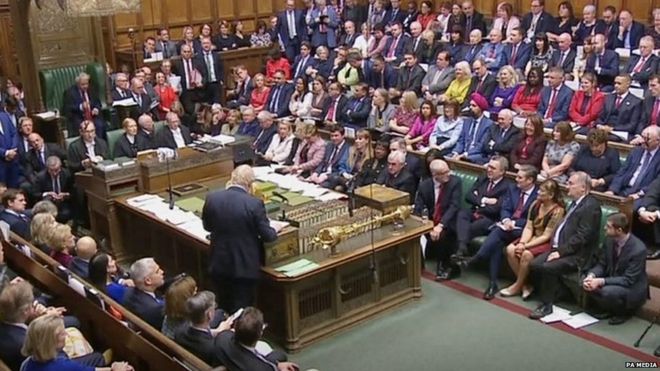 PA MEDIA
PA MEDIA
MPs are debating the PM's Brexit deal, amid uncertainty about whether the decisive vote on it will go ahead.
The PM is trying to convince MPs to support the agreement he secured with the EU, in Parliament's first Saturday session in 37 years.
Mr Johnson told MPs "now is the time to get this thing done", saying any delay beyond 31 October would be "corrosive".
But MPs will debate a proposal that could delay Brexit again until all the necessary UK legislation is passed.
Commons Speaker John Bercow has chosen an amendment that, if passed, would require the PM to write to the EU by the end of the day to ask for a three-month extension to Brexit.
Downing Street has threatened to postpone the vote on the revised deal altogether if MPs vote for a Brexit delay.
If the vote does go ahead, it is expected to be incredibly close, with the PM's former DUP allies and opposition parties planning to vote against the PM's deal.
- Saturday's Brexit debate: What to expect
- What is in Boris Johnson's new Brexit deal?
- Could the Letwin amendment delay Brexit?
- How might MPs vote on the Brexit deal?
Labour leader Jeremy Corbyn said his party would "not be duped" into voting for an agreement which would leave the UK worse off.
However, at least nine Labour MPs are expected to support the government while the PM is hoping to be backed by some of the 21 Tory MPs he sacked for opposing him last month.
Steve Baker, the chairman of the European Research Group, a group of Tory Brexiteers, recommended its members vote in favour of the deal at a meeting on Saturday morning.
Mr Johnson has defended the terms of of his revised EU withdrawal agreement at the start of the first weekend sitting since the invasion of the Falklands in 1982.
'Heal rifts'
He urged MPs to come together to begin to "heal the rifts in British politics", saying he believed a majority of MPs were committed to delivering the result of the 2016 referendum.
He suggested any further negotiations would be fruitless and urged opponents of Brexit to "abandon their delusion" that any further delay would help the UK.
"It is my judgement we have reached the best possible solution," he said.
"I must tell the House, in all candour, whatever letters they may seek to force the government to write, it cannot change my judgement that further delay is pointless, expensive and deeply corrosive of public trust."
After several hours of debate, there will be series of votes, not expected before 14.30 BST.
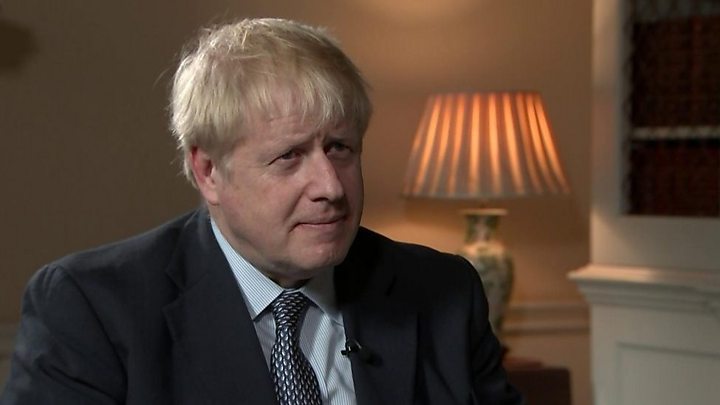
Among the amendments chosen by Speaker John Bercow to be voted on is a controversial one put down by former Tory Sir Oliver Letwin, who now sits as an independent.
This would withhold parliamentary support for the deal unless and until legislation implementing the agreement in UK law is passed by MPs.
If this amendment is passed, it would force the prime minister to seek a further delay to Brexit beyond the 31 October deadline - under the terms of the Benn Act passed last month.
The BBC's political editor Laura Kuenssberg said its "brutal effect" would be to deny the PM the opportunity of having the "conclusive" vote on his deal he so badly wants.
A No 10 source has said the vote on Mr Johnson's deal will be abandoned if the amendment is passed, saying it will "render the entire day meaningless".
"A vote for Letwin is a vote for delay and the whips will send everyone home," they said. "It would perfectly sum up this broken Parliament."
Former Tory Chancellor Philip Hammond, who is backing the amendment, told us at the BBC that it was an "insurance policy" to ensure the UK did not leave the EU later this month without a deal if the necessary legislation was not passed in time or was scuppered by MPs.
He insisted he was not trying to stop Brexit and it might only lead to a delay to the UK's departure of a matter of weeks.
Mr Johnson has repeatedly said Brexit will happen by the end of the month with or without a deal.
However, MPs passed a law in September, known as the Benn Act, which requires the PM to send a letter to the EU asking for an extension until January 2020 if a deal is not agreed - or if MPs do not back a no-deal Brexit.
Mr Johnson's revised deal with the EU, secured at a Brussels summit on Thursday, ditches former PM Theresa May's backstop, the measure designed to prevent a return to physical checks on the Irish border.
Instead it will, in effect, draw a new customs border along the Irish Sea.
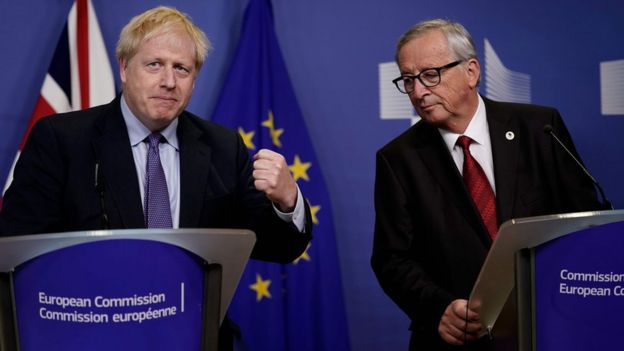 GETTY IMAGES
GETTY IMAGES
A number of Tory MPs who voted against Mrs May's agreement on all three occasions it was put to the Commons - the so-called "Spartans" - have said they will be supporting the deal.
These include Mark Francois, the deputy chairman of the ERG of Tory Brexiteers, Iain Duncan Smith and Bernard Jenkin.
- The Papers: 'Johnson's day of reckoning' as MPs vote on deal
- Sturgeon fears Labour rebels will help pass Brexit
- Carney: Brexit deal 'positive' for UK economy
Also crucial to Mr Johnson's hopes of success will be the Tories who had the whip withdrawn for supporting a bill to force the PM to seek an extension to avoid a no-deal Brexit.
'Sell-out'
The vast majority of Labour MPs will oppose the deal, which Jeremy Corbyn has branded a "sell-out" and worse than Theresa May's agreement rejected three times by MPs.
The government appears to have moved to allay concerns expressed by some Labour MPs by announcing workers' rights and environmental standards will be boosted post-Brexit and that MPs will have an enhanced role in determining the UK's future relationship with the EU.
- The Papers: 'Johnson's day of reckoning' as MPs vote on deal
- Sturgeon fears Labour rebels will help pass Brexit
- Carney: Brexit deal 'positive' for UK economy
Downing Street confirmed its pledges followed discussions held with opposition MPs but Mr Corbyn said these were "empty promises".
"This government cannot be trusted and these benches will not be duped," he said.
"Supporting the government this afternoon will merely fire the starting pistol in a race to the bottom in regulations and standards."
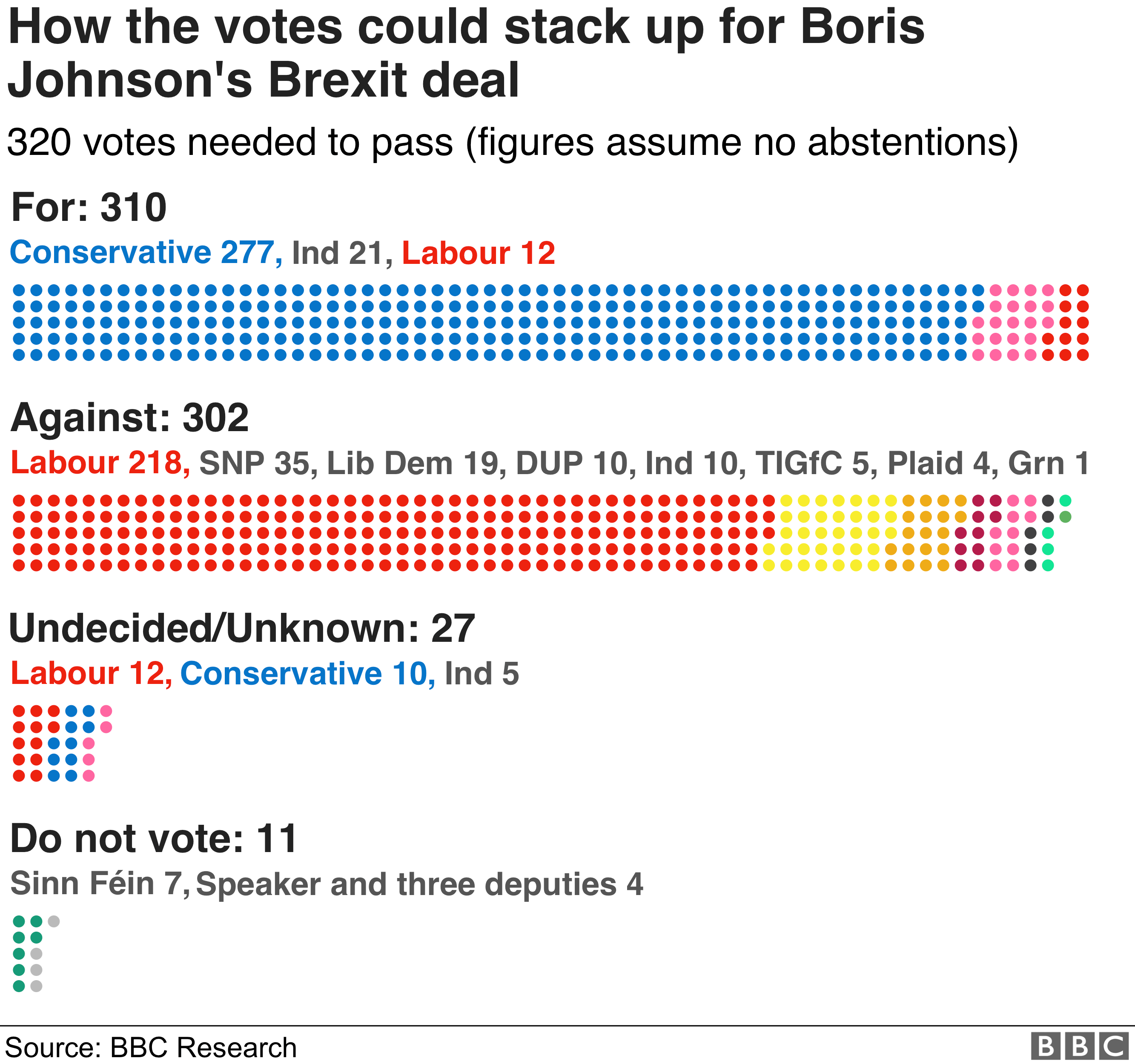

Northern Ireland's Democratic Unionists have made clear they will not be voting for the deal, saying it would "drive a coach and horses" through the power-sharing arrangements enshrined in the Good Friday Agreement.
The party's Westminster leader Nigel Dodds said "weariness" over the Brexit process "should not be an excuse for weakness on the union".
"There may be special circumstances for Northern Ireland but that can only be with consent of the people - unionists and nationalists together. He must respect that."
And the SNP's Ian Blackford said it would not support an agreement which would see Scotland "shafted" economically.
As the debate goes on, thousands of people are expected in central London, to call for a so-called People's Vote, asking for a new referendum on the Brexit deal.
- Brexit: No better outcome than my deal, says Johnson
- Saturday's Brexit votes in Parliament: What's going on?
- Brexit deal: Which MP votes are up for grabs?
- In full: Laura Kuenssberg grills Johnson on Brexit deal
- Brexit: What is in Boris Johnson's new deal with the EU?
- Brexit: What is the Letwin amendment and will it pass?

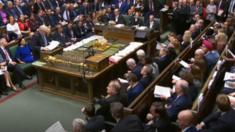
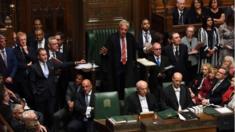
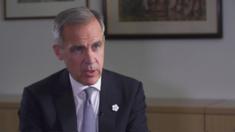



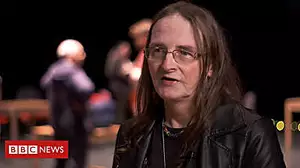







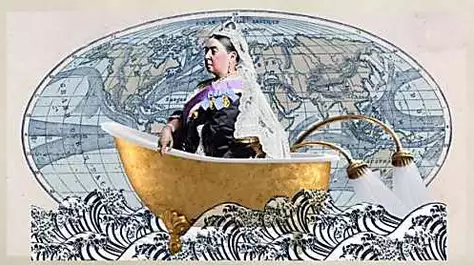
![[Pics] What’s A Duchess To Do? The New Rules In Meghan Markle's Life [Pics] What’s A Duchess To Do? The New Rules In Meghan Markle's Life](https://images.outbrainimg.com/transform/v3/eyJpdSI6IjhhYTE4ZjNlMWNjNzlmZTZmMjlkODY5MzhhYjlkYWUyNzc4MGYzZTE5OTA3NDIzN2M3NWJmM2NiYmRkMmIzNDciLCJ3IjoxNjAsImgiOjkwLCJkIjoxLjUsImNzIjowLCJmIjo0fQ.webp)
![[Photos] New Findings In Cave Can't Be Explained By Scientists [Photos] New Findings In Cave Can't Be Explained By Scientists](https://images.outbrainimg.com/transform/v3/eyJpdSI6ImUzNDU5MTllZmI5MDRjM2ZiZmEwMDAxNzI5YjNkMGQ1NDQ0MTRlNzMyMDZmNGM1YzA4OWMyNDhmYWJmNmYwOTkiLCJ3IjoxNjAsImgiOjkwLCJkIjoxLjUsImNzIjowLCJmIjo0fQ.webp)




No comments:
Post a Comment